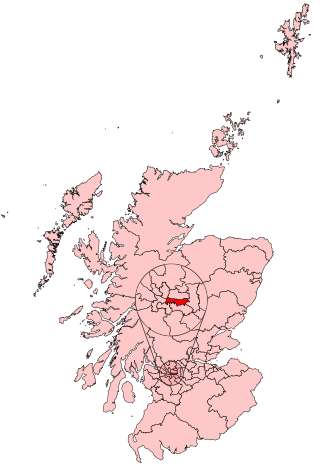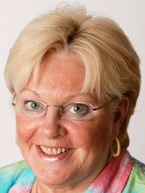Related Research Articles

Glasgow East is a constituency of the House of Commons of the UK Parliament, located in the city of Glasgow, Scotland. It elects one Member of Parliament at least once every five years using the first-past-the-post system of voting. It is currently represented by John Grady of the Labour Party who has been the MP since 2024.

The 1989 Glasgow Central by-election, in the Glasgow Central constituency, was held on 15 June 1989. It was caused by the death of the sitting UK Member of Parliament, Bob McTaggart.
Robert McTaggart was a Scottish politician who served as a Member of Parliament (MP) for Glasgow Central, representing the Labour Party. McTaggart was on the left of his party, and took up issues of unemployment and poor housing which affected his constituency. He also took a particular interest in international affairs, being a supporter of the Palestine Liberation Organization and visiting Libya, North Korea and the Soviet Union. McTaggart died of a sudden heart attack at the age of 43.

The 1980 Glasgow Central by-election was a by-election held on 26 June 1980 for the British House of Commons constituency of Glasgow Central, following the death of its sitting MP, Thomas McMillan.
Helen Margaret McElhone was a Scottish politician. She worked together with her husband, Frank McElhone, during his time as a Member of Parliament (MP) representing Glasgow from 1969. After his sudden death, McElhone was elected as his successor; but within six months her Glasgow Queen's Park constituency was abolished in boundary changes and she lost out to a neighbouring MP in the selection for a new seat. She continued her political activity after leaving Parliament.

The 1973 Glasgow Govan by-election was held on 8 November 1973, following the death of John Rankin, Labour Party Member of Parliament for the Glasgow Govan constituency. Rankin had died one month earlier, on 8 October 1973. Rankin had held the seat since 1955. With the exception of a narrow Conservative victory in 1950, the seat had been solidly Labour-held since 1918. For the by-election the Labour Party nominated Harry Selby, a veteran activist in Glasgow and a former Trotskyist. It was later reported that Selby's selection had been controversial with some Labour members who felt that at the age of 61 he was too old to be starting a parliamentary career.

The 2011 Scottish Parliament election was held on Thursday, 5 May 2011 to elect 129 members to the Scottish Parliament.

The 1982 Glasgow Hillhead by-election was held on 25 March 1982. The by-election was caused by the death of the Conservative Party Member of Parliament for Glasgow Hillhead Tam Galbraith on 2 January 1982.
The 1970 South Ayrshire by-election of 19 March 1970 was held after the death of Labour Member of Parliament (MP) Emrys Hughes on 18 October 1969. The seat was retained by the Labour Party.

The 1982 Glasgow Queen's Park by-election was a parliamentary by-election held on 2 December 1982 for the UK House of Commons constituency of Glasgow Queen's Park.
The 1978 Berwick and East Lothian by-election was a by-election held for the House of Commons constituency of Berwick and East Lothian in Scotland on 26 October 1978. It was one of two UK parliamentary by-elections held on that day, and was won by the Labour Party candidate John Home Robertson.
The 1973 Dundee East by-election, in Scotland, was held on 1 March 1973. It was one of three UK parliamentary by-elections held on that day. It was caused by the appointment of George Thomson as a European commissioner. George Machin retained the seat for Labour, but only narrowly. There was a strong showing by the Scottish National Party, which prefigured their serious breakthrough at the Govan by-election later in the year, and the two general elections of 1974.
A 1973 by-election for the House of Commons of the UK Parliament took place in Edinburgh North on 8 November 1973. Alexander Fletcher retained the seat for the Conservatives, after his predecessor became Duke of Buccleuch.
The 1969 Newcastle-under-Lyme by-election of 30 October 1969 was caused by the death of Labour MP Stephen Swingler in February of that year. It was held on the same day as four other by-elections and the seat was retained by Labour.
There was a 1964 by-election for the constituency of Rutherglen in the UK House of Commons on 14 May 1964, not long before the 1964 general election.
George Andrew Leslie was a Scottish politician and veterinary surgeon. He was the Scottish National Party (SNP)'s Senior Vice-Chairman from 1969 to 1971.
The 1969 Swindon by-election of 30 October 1969 was held after Labour Member of Parliament (MP) Francis Noel-Baker resigned from the House of Commons. The seat was won by the Conservative Party in a defeat for Harold Wilson's government.
The 1952 Dundee East by-election was held on 17 July 1952, due to the death in a road accident of the incumbent Labour MP, Thomas Cook. It was won by the Labour candidate George Thomson.
The 1940 Argyllshire by-election was a parliamentary by-election for the British House of Commons constituency of Argyllshire, on 10 April 1940.

A general election was held in the United Kingdom on Thursday, 11 June 1987 and all 72 seats in Scotland were contested.
References
- ↑ 'Gorbals by-election date set' Glasgow Herald 3 October 1969
- 1 2 3 Craig, F. W. S. (1971). British parliamentary Election Results 1950-1970. Chichester: Political Reference Publications. p. 611. ISBN 0-900178-02-7.
- 1 2 3 Warden, John (30 October 1969). "Tories need 13% swing to win four seats". The Glasgow Herald. p. 1. Retrieved 6 July 2020.
- ↑ "Fickle Guide". The Glasgow Herald. 30 October 1969. p. 12. Retrieved 7 July 2020.
- ↑ "1969 By Election Results". British Elections Ephemera Archive. Archived from the original on 14 March 2012. Retrieved 26 August 2015.
- 1 2 Warden, John (31 October 1969). "Tories Gain One Seat in Five By-elections". The Glasgow Herald. p. 1. Retrieved 5 July 2020.